Health Behavior Change: Trans-Theoretical Model & Motivation Interview
VerifiedAdded on 2023/06/05
|10
|2488
|307
Essay
AI Summary
This essay discusses the application of the Trans-Theoretical Model (TTM) in conjunction with motivational interviewing to facilitate health behavior change in a patient, Alistair, suffering from obesity and osteoarthritis. The TTM, which includes stages like pre-contemplation, contemplation, preparation, action, maintenance, and termination, is used to guide interventions. Alistair is currently in the contemplation stage, recognizing his problematic behavior but ambivalent about change. The essay emphasizes the importance of motivational interviewing in the preparation stage, highlighting its core principles of collaboration, evocation, autonomy, and compassion. By applying these principles, nursing professionals can empower Alistair to move through the stages, adopt healthier behaviors, and prevent relapse, ultimately improving his quality of life and preventing further health complications. The paper concludes that combining TTM with motivational interviewing offers a comprehensive approach to promoting positive health behavior changes in patients.
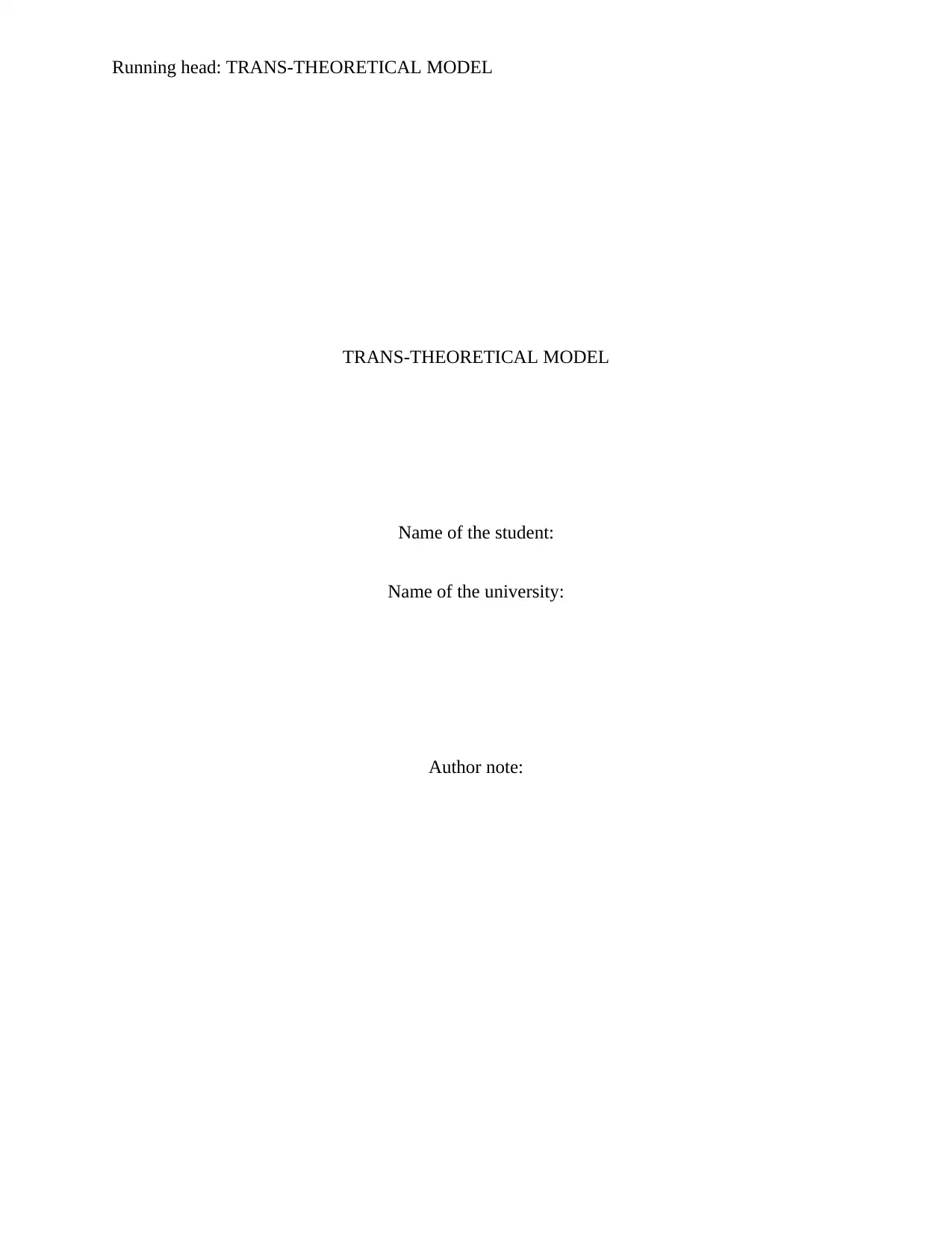
Running head: TRANS-THEORETICAL MODEL
TRANS-THEORETICAL MODEL
Name of the student:
Name of the university:
Author note:
TRANS-THEORETICAL MODEL
Name of the student:
Name of the university:
Author note:
Paraphrase This Document
Need a fresh take? Get an instant paraphrase of this document with our AI Paraphraser
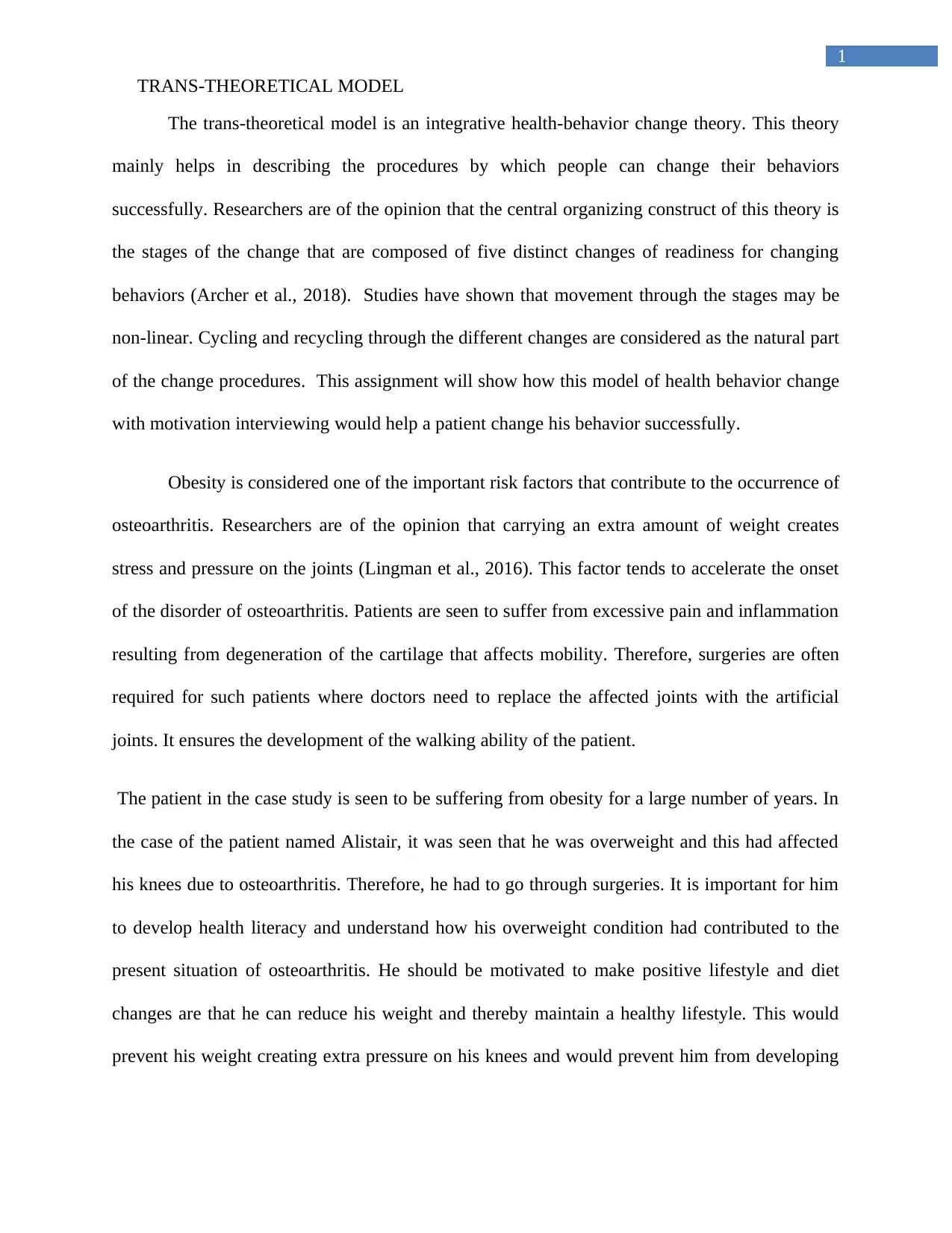
1
TRANS-THEORETICAL MODEL
The trans-theoretical model is an integrative health-behavior change theory. This theory
mainly helps in describing the procedures by which people can change their behaviors
successfully. Researchers are of the opinion that the central organizing construct of this theory is
the stages of the change that are composed of five distinct changes of readiness for changing
behaviors (Archer et al., 2018). Studies have shown that movement through the stages may be
non-linear. Cycling and recycling through the different changes are considered as the natural part
of the change procedures. This assignment will show how this model of health behavior change
with motivation interviewing would help a patient change his behavior successfully.
Obesity is considered one of the important risk factors that contribute to the occurrence of
osteoarthritis. Researchers are of the opinion that carrying an extra amount of weight creates
stress and pressure on the joints (Lingman et al., 2016). This factor tends to accelerate the onset
of the disorder of osteoarthritis. Patients are seen to suffer from excessive pain and inflammation
resulting from degeneration of the cartilage that affects mobility. Therefore, surgeries are often
required for such patients where doctors need to replace the affected joints with the artificial
joints. It ensures the development of the walking ability of the patient.
The patient in the case study is seen to be suffering from obesity for a large number of years. In
the case of the patient named Alistair, it was seen that he was overweight and this had affected
his knees due to osteoarthritis. Therefore, he had to go through surgeries. It is important for him
to develop health literacy and understand how his overweight condition had contributed to the
present situation of osteoarthritis. He should be motivated to make positive lifestyle and diet
changes are that he can reduce his weight and thereby maintain a healthy lifestyle. This would
prevent his weight creating extra pressure on his knees and would prevent him from developing
TRANS-THEORETICAL MODEL
The trans-theoretical model is an integrative health-behavior change theory. This theory
mainly helps in describing the procedures by which people can change their behaviors
successfully. Researchers are of the opinion that the central organizing construct of this theory is
the stages of the change that are composed of five distinct changes of readiness for changing
behaviors (Archer et al., 2018). Studies have shown that movement through the stages may be
non-linear. Cycling and recycling through the different changes are considered as the natural part
of the change procedures. This assignment will show how this model of health behavior change
with motivation interviewing would help a patient change his behavior successfully.
Obesity is considered one of the important risk factors that contribute to the occurrence of
osteoarthritis. Researchers are of the opinion that carrying an extra amount of weight creates
stress and pressure on the joints (Lingman et al., 2016). This factor tends to accelerate the onset
of the disorder of osteoarthritis. Patients are seen to suffer from excessive pain and inflammation
resulting from degeneration of the cartilage that affects mobility. Therefore, surgeries are often
required for such patients where doctors need to replace the affected joints with the artificial
joints. It ensures the development of the walking ability of the patient.
The patient in the case study is seen to be suffering from obesity for a large number of years. In
the case of the patient named Alistair, it was seen that he was overweight and this had affected
his knees due to osteoarthritis. Therefore, he had to go through surgeries. It is important for him
to develop health literacy and understand how his overweight condition had contributed to the
present situation of osteoarthritis. He should be motivated to make positive lifestyle and diet
changes are that he can reduce his weight and thereby maintain a healthy lifestyle. This would
prevent his weight creating extra pressure on his knees and would prevent him from developing
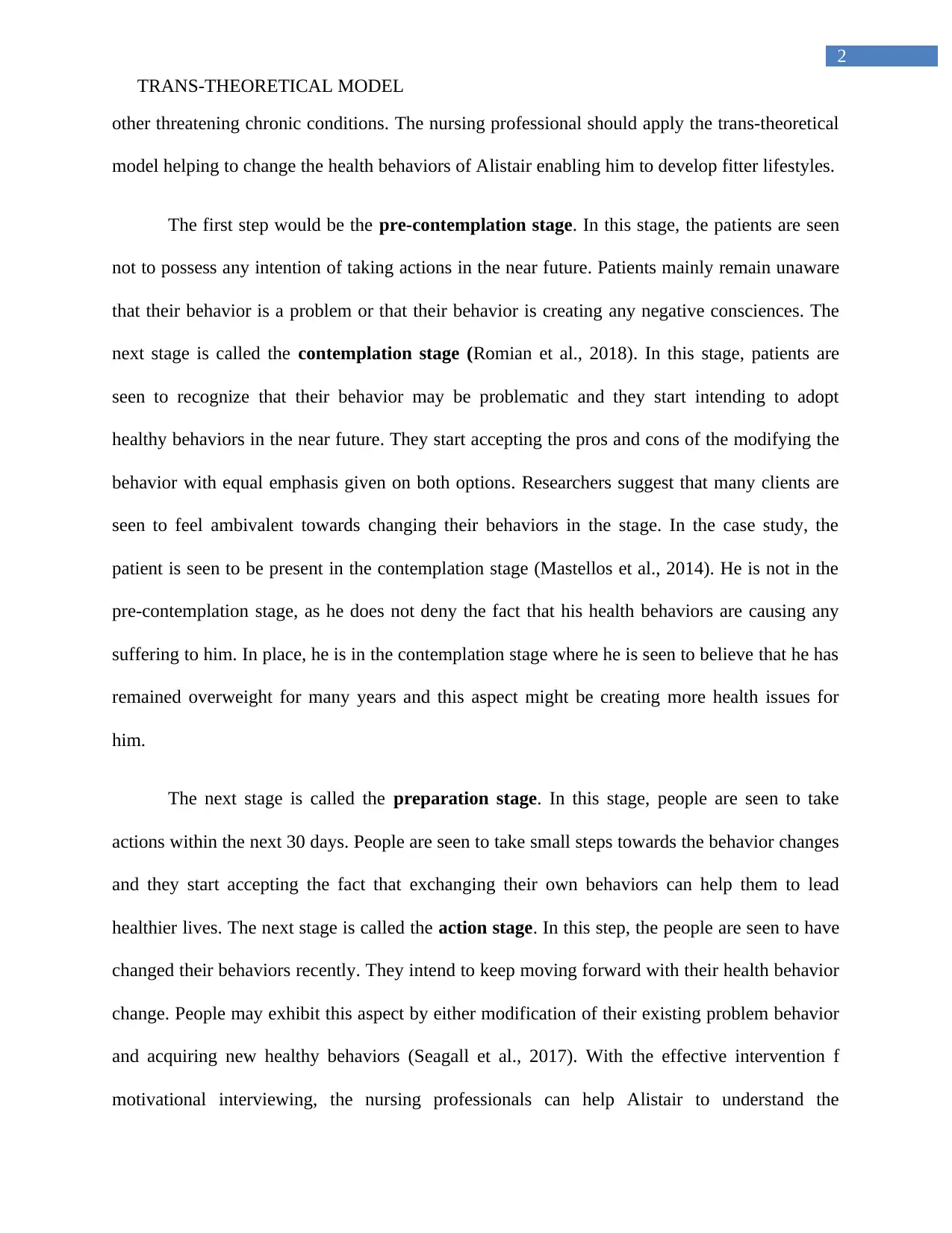
2
TRANS-THEORETICAL MODEL
other threatening chronic conditions. The nursing professional should apply the trans-theoretical
model helping to change the health behaviors of Alistair enabling him to develop fitter lifestyles.
The first step would be the pre-contemplation stage. In this stage, the patients are seen
not to possess any intention of taking actions in the near future. Patients mainly remain unaware
that their behavior is a problem or that their behavior is creating any negative consciences. The
next stage is called the contemplation stage (Romian et al., 2018). In this stage, patients are
seen to recognize that their behavior may be problematic and they start intending to adopt
healthy behaviors in the near future. They start accepting the pros and cons of the modifying the
behavior with equal emphasis given on both options. Researchers suggest that many clients are
seen to feel ambivalent towards changing their behaviors in the stage. In the case study, the
patient is seen to be present in the contemplation stage (Mastellos et al., 2014). He is not in the
pre-contemplation stage, as he does not deny the fact that his health behaviors are causing any
suffering to him. In place, he is in the contemplation stage where he is seen to believe that he has
remained overweight for many years and this aspect might be creating more health issues for
him.
The next stage is called the preparation stage. In this stage, people are seen to take
actions within the next 30 days. People are seen to take small steps towards the behavior changes
and they start accepting the fact that exchanging their own behaviors can help them to lead
healthier lives. The next stage is called the action stage. In this step, the people are seen to have
changed their behaviors recently. They intend to keep moving forward with their health behavior
change. People may exhibit this aspect by either modification of their existing problem behavior
and acquiring new healthy behaviors (Seagall et al., 2017). With the effective intervention f
motivational interviewing, the nursing professionals can help Alistair to understand the
TRANS-THEORETICAL MODEL
other threatening chronic conditions. The nursing professional should apply the trans-theoretical
model helping to change the health behaviors of Alistair enabling him to develop fitter lifestyles.
The first step would be the pre-contemplation stage. In this stage, the patients are seen
not to possess any intention of taking actions in the near future. Patients mainly remain unaware
that their behavior is a problem or that their behavior is creating any negative consciences. The
next stage is called the contemplation stage (Romian et al., 2018). In this stage, patients are
seen to recognize that their behavior may be problematic and they start intending to adopt
healthy behaviors in the near future. They start accepting the pros and cons of the modifying the
behavior with equal emphasis given on both options. Researchers suggest that many clients are
seen to feel ambivalent towards changing their behaviors in the stage. In the case study, the
patient is seen to be present in the contemplation stage (Mastellos et al., 2014). He is not in the
pre-contemplation stage, as he does not deny the fact that his health behaviors are causing any
suffering to him. In place, he is in the contemplation stage where he is seen to believe that he has
remained overweight for many years and this aspect might be creating more health issues for
him.
The next stage is called the preparation stage. In this stage, people are seen to take
actions within the next 30 days. People are seen to take small steps towards the behavior changes
and they start accepting the fact that exchanging their own behaviors can help them to lead
healthier lives. The next stage is called the action stage. In this step, the people are seen to have
changed their behaviors recently. They intend to keep moving forward with their health behavior
change. People may exhibit this aspect by either modification of their existing problem behavior
and acquiring new healthy behaviors (Seagall et al., 2017). With the effective intervention f
motivational interviewing, the nursing professionals can help Alistair to understand the
⊘ This is a preview!⊘
Do you want full access?
Subscribe today to unlock all pages.

Trusted by 1+ million students worldwide
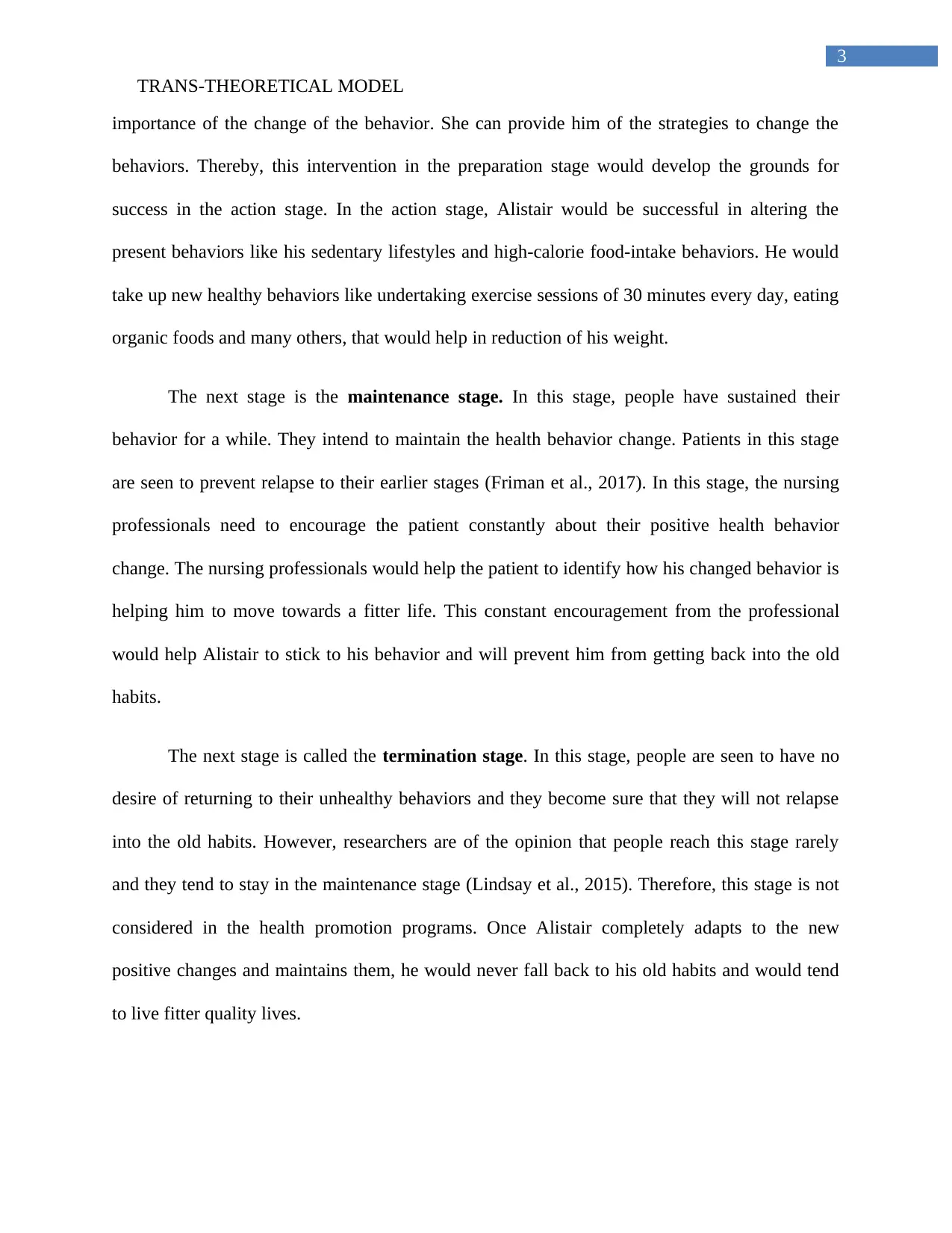
3
TRANS-THEORETICAL MODEL
importance of the change of the behavior. She can provide him of the strategies to change the
behaviors. Thereby, this intervention in the preparation stage would develop the grounds for
success in the action stage. In the action stage, Alistair would be successful in altering the
present behaviors like his sedentary lifestyles and high-calorie food-intake behaviors. He would
take up new healthy behaviors like undertaking exercise sessions of 30 minutes every day, eating
organic foods and many others, that would help in reduction of his weight.
The next stage is the maintenance stage. In this stage, people have sustained their
behavior for a while. They intend to maintain the health behavior change. Patients in this stage
are seen to prevent relapse to their earlier stages (Friman et al., 2017). In this stage, the nursing
professionals need to encourage the patient constantly about their positive health behavior
change. The nursing professionals would help the patient to identify how his changed behavior is
helping him to move towards a fitter life. This constant encouragement from the professional
would help Alistair to stick to his behavior and will prevent him from getting back into the old
habits.
The next stage is called the termination stage. In this stage, people are seen to have no
desire of returning to their unhealthy behaviors and they become sure that they will not relapse
into the old habits. However, researchers are of the opinion that people reach this stage rarely
and they tend to stay in the maintenance stage (Lindsay et al., 2015). Therefore, this stage is not
considered in the health promotion programs. Once Alistair completely adapts to the new
positive changes and maintains them, he would never fall back to his old habits and would tend
to live fitter quality lives.
TRANS-THEORETICAL MODEL
importance of the change of the behavior. She can provide him of the strategies to change the
behaviors. Thereby, this intervention in the preparation stage would develop the grounds for
success in the action stage. In the action stage, Alistair would be successful in altering the
present behaviors like his sedentary lifestyles and high-calorie food-intake behaviors. He would
take up new healthy behaviors like undertaking exercise sessions of 30 minutes every day, eating
organic foods and many others, that would help in reduction of his weight.
The next stage is the maintenance stage. In this stage, people have sustained their
behavior for a while. They intend to maintain the health behavior change. Patients in this stage
are seen to prevent relapse to their earlier stages (Friman et al., 2017). In this stage, the nursing
professionals need to encourage the patient constantly about their positive health behavior
change. The nursing professionals would help the patient to identify how his changed behavior is
helping him to move towards a fitter life. This constant encouragement from the professional
would help Alistair to stick to his behavior and will prevent him from getting back into the old
habits.
The next stage is called the termination stage. In this stage, people are seen to have no
desire of returning to their unhealthy behaviors and they become sure that they will not relapse
into the old habits. However, researchers are of the opinion that people reach this stage rarely
and they tend to stay in the maintenance stage (Lindsay et al., 2015). Therefore, this stage is not
considered in the health promotion programs. Once Alistair completely adapts to the new
positive changes and maintains them, he would never fall back to his old habits and would tend
to live fitter quality lives.
Paraphrase This Document
Need a fresh take? Get an instant paraphrase of this document with our AI Paraphraser
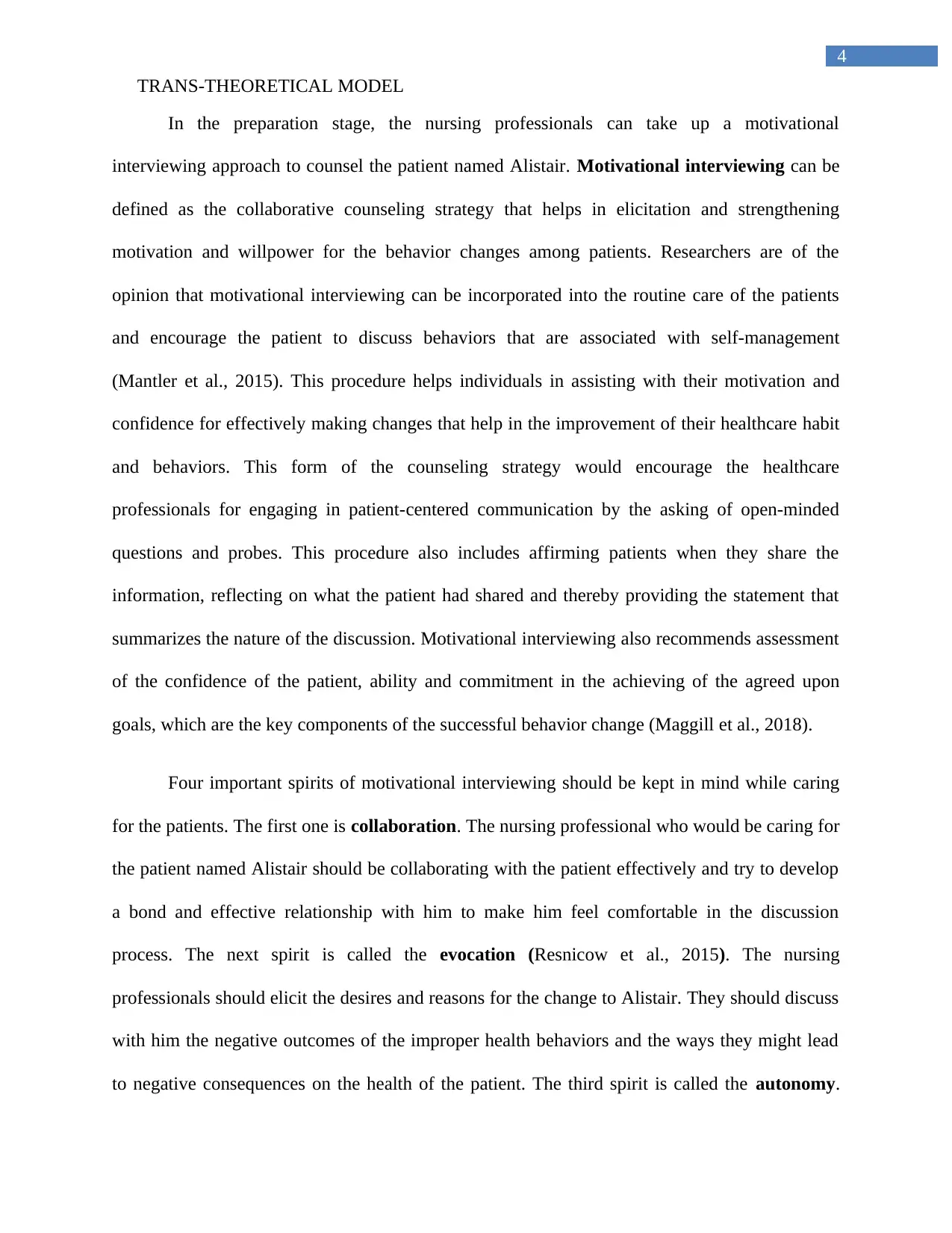
4
TRANS-THEORETICAL MODEL
In the preparation stage, the nursing professionals can take up a motivational
interviewing approach to counsel the patient named Alistair. Motivational interviewing can be
defined as the collaborative counseling strategy that helps in elicitation and strengthening
motivation and willpower for the behavior changes among patients. Researchers are of the
opinion that motivational interviewing can be incorporated into the routine care of the patients
and encourage the patient to discuss behaviors that are associated with self-management
(Mantler et al., 2015). This procedure helps individuals in assisting with their motivation and
confidence for effectively making changes that help in the improvement of their healthcare habit
and behaviors. This form of the counseling strategy would encourage the healthcare
professionals for engaging in patient-centered communication by the asking of open-minded
questions and probes. This procedure also includes affirming patients when they share the
information, reflecting on what the patient had shared and thereby providing the statement that
summarizes the nature of the discussion. Motivational interviewing also recommends assessment
of the confidence of the patient, ability and commitment in the achieving of the agreed upon
goals, which are the key components of the successful behavior change (Maggill et al., 2018).
Four important spirits of motivational interviewing should be kept in mind while caring
for the patients. The first one is collaboration. The nursing professional who would be caring for
the patient named Alistair should be collaborating with the patient effectively and try to develop
a bond and effective relationship with him to make him feel comfortable in the discussion
process. The next spirit is called the evocation (Resnicow et al., 2015). The nursing
professionals should elicit the desires and reasons for the change to Alistair. They should discuss
with him the negative outcomes of the improper health behaviors and the ways they might lead
to negative consequences on the health of the patient. The third spirit is called the autonomy.
TRANS-THEORETICAL MODEL
In the preparation stage, the nursing professionals can take up a motivational
interviewing approach to counsel the patient named Alistair. Motivational interviewing can be
defined as the collaborative counseling strategy that helps in elicitation and strengthening
motivation and willpower for the behavior changes among patients. Researchers are of the
opinion that motivational interviewing can be incorporated into the routine care of the patients
and encourage the patient to discuss behaviors that are associated with self-management
(Mantler et al., 2015). This procedure helps individuals in assisting with their motivation and
confidence for effectively making changes that help in the improvement of their healthcare habit
and behaviors. This form of the counseling strategy would encourage the healthcare
professionals for engaging in patient-centered communication by the asking of open-minded
questions and probes. This procedure also includes affirming patients when they share the
information, reflecting on what the patient had shared and thereby providing the statement that
summarizes the nature of the discussion. Motivational interviewing also recommends assessment
of the confidence of the patient, ability and commitment in the achieving of the agreed upon
goals, which are the key components of the successful behavior change (Maggill et al., 2018).
Four important spirits of motivational interviewing should be kept in mind while caring
for the patients. The first one is collaboration. The nursing professional who would be caring for
the patient named Alistair should be collaborating with the patient effectively and try to develop
a bond and effective relationship with him to make him feel comfortable in the discussion
process. The next spirit is called the evocation (Resnicow et al., 2015). The nursing
professionals should elicit the desires and reasons for the change to Alistair. They should discuss
with him the negative outcomes of the improper health behaviors and the ways they might lead
to negative consequences on the health of the patient. The third spirit is called the autonomy.
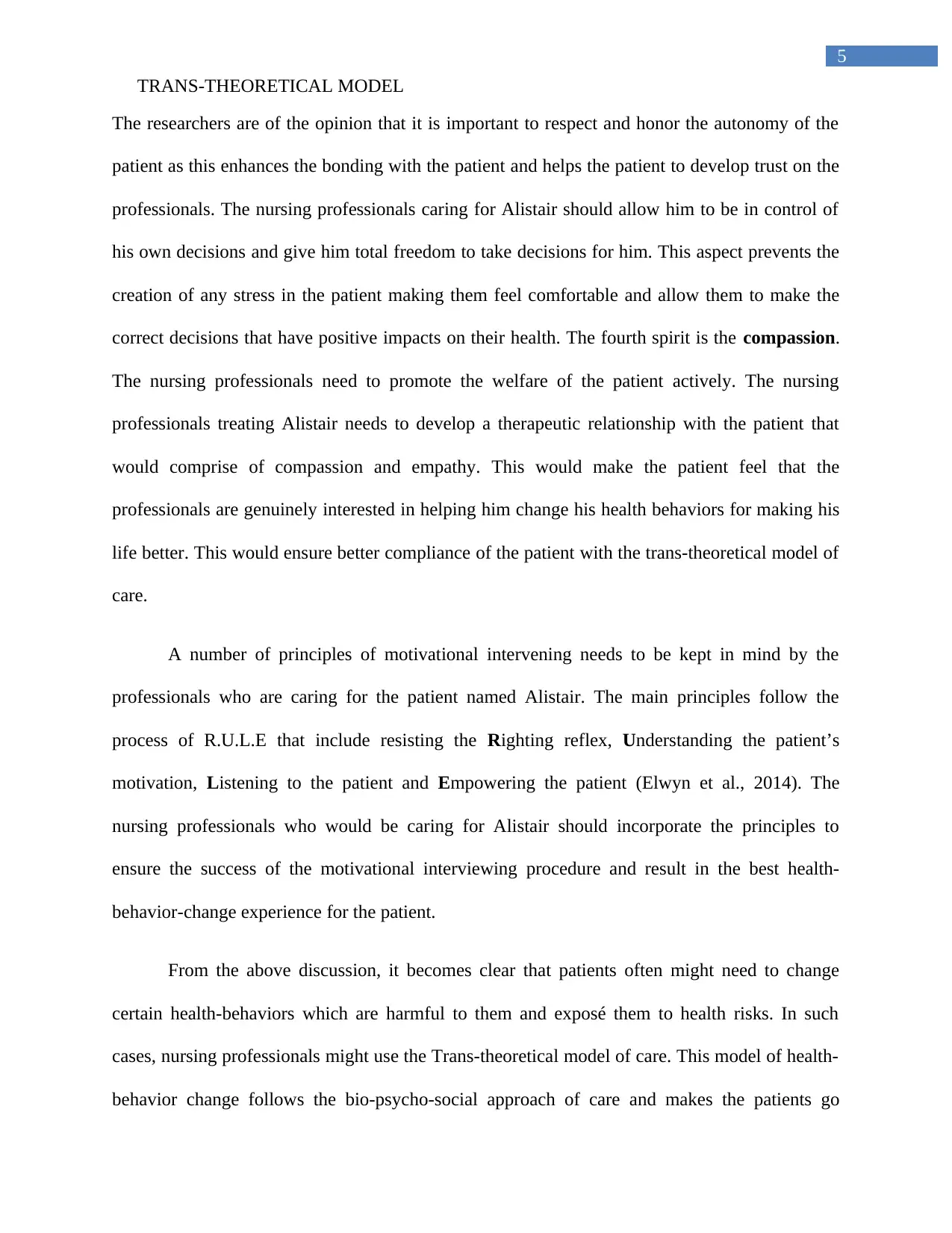
5
TRANS-THEORETICAL MODEL
The researchers are of the opinion that it is important to respect and honor the autonomy of the
patient as this enhances the bonding with the patient and helps the patient to develop trust on the
professionals. The nursing professionals caring for Alistair should allow him to be in control of
his own decisions and give him total freedom to take decisions for him. This aspect prevents the
creation of any stress in the patient making them feel comfortable and allow them to make the
correct decisions that have positive impacts on their health. The fourth spirit is the compassion.
The nursing professionals need to promote the welfare of the patient actively. The nursing
professionals treating Alistair needs to develop a therapeutic relationship with the patient that
would comprise of compassion and empathy. This would make the patient feel that the
professionals are genuinely interested in helping him change his health behaviors for making his
life better. This would ensure better compliance of the patient with the trans-theoretical model of
care.
A number of principles of motivational intervening needs to be kept in mind by the
professionals who are caring for the patient named Alistair. The main principles follow the
process of R.U.L.E that include resisting the Righting reflex, Understanding the patient’s
motivation, Listening to the patient and Empowering the patient (Elwyn et al., 2014). The
nursing professionals who would be caring for Alistair should incorporate the principles to
ensure the success of the motivational interviewing procedure and result in the best health-
behavior-change experience for the patient.
From the above discussion, it becomes clear that patients often might need to change
certain health-behaviors which are harmful to them and exposé them to health risks. In such
cases, nursing professionals might use the Trans-theoretical model of care. This model of health-
behavior change follows the bio-psycho-social approach of care and makes the patients go
TRANS-THEORETICAL MODEL
The researchers are of the opinion that it is important to respect and honor the autonomy of the
patient as this enhances the bonding with the patient and helps the patient to develop trust on the
professionals. The nursing professionals caring for Alistair should allow him to be in control of
his own decisions and give him total freedom to take decisions for him. This aspect prevents the
creation of any stress in the patient making them feel comfortable and allow them to make the
correct decisions that have positive impacts on their health. The fourth spirit is the compassion.
The nursing professionals need to promote the welfare of the patient actively. The nursing
professionals treating Alistair needs to develop a therapeutic relationship with the patient that
would comprise of compassion and empathy. This would make the patient feel that the
professionals are genuinely interested in helping him change his health behaviors for making his
life better. This would ensure better compliance of the patient with the trans-theoretical model of
care.
A number of principles of motivational intervening needs to be kept in mind by the
professionals who are caring for the patient named Alistair. The main principles follow the
process of R.U.L.E that include resisting the Righting reflex, Understanding the patient’s
motivation, Listening to the patient and Empowering the patient (Elwyn et al., 2014). The
nursing professionals who would be caring for Alistair should incorporate the principles to
ensure the success of the motivational interviewing procedure and result in the best health-
behavior-change experience for the patient.
From the above discussion, it becomes clear that patients often might need to change
certain health-behaviors which are harmful to them and exposé them to health risks. In such
cases, nursing professionals might use the Trans-theoretical model of care. This model of health-
behavior change follows the bio-psycho-social approach of care and makes the patients go
⊘ This is a preview!⊘
Do you want full access?
Subscribe today to unlock all pages.

Trusted by 1+ million students worldwide
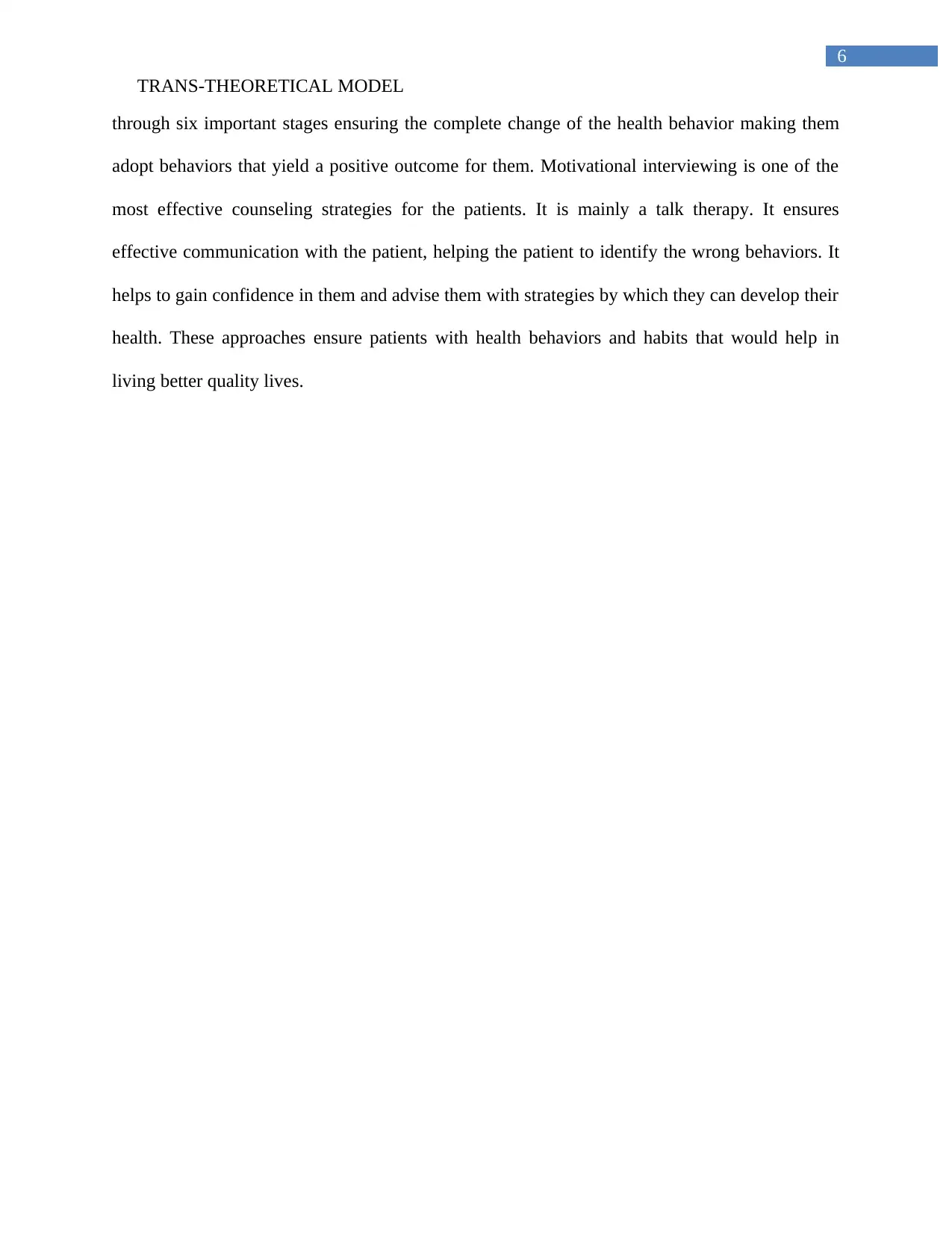
6
TRANS-THEORETICAL MODEL
through six important stages ensuring the complete change of the health behavior making them
adopt behaviors that yield a positive outcome for them. Motivational interviewing is one of the
most effective counseling strategies for the patients. It is mainly a talk therapy. It ensures
effective communication with the patient, helping the patient to identify the wrong behaviors. It
helps to gain confidence in them and advise them with strategies by which they can develop their
health. These approaches ensure patients with health behaviors and habits that would help in
living better quality lives.
TRANS-THEORETICAL MODEL
through six important stages ensuring the complete change of the health behavior making them
adopt behaviors that yield a positive outcome for them. Motivational interviewing is one of the
most effective counseling strategies for the patients. It is mainly a talk therapy. It ensures
effective communication with the patient, helping the patient to identify the wrong behaviors. It
helps to gain confidence in them and advise them with strategies by which they can develop their
health. These approaches ensure patients with health behaviors and habits that would help in
living better quality lives.
Paraphrase This Document
Need a fresh take? Get an instant paraphrase of this document with our AI Paraphraser
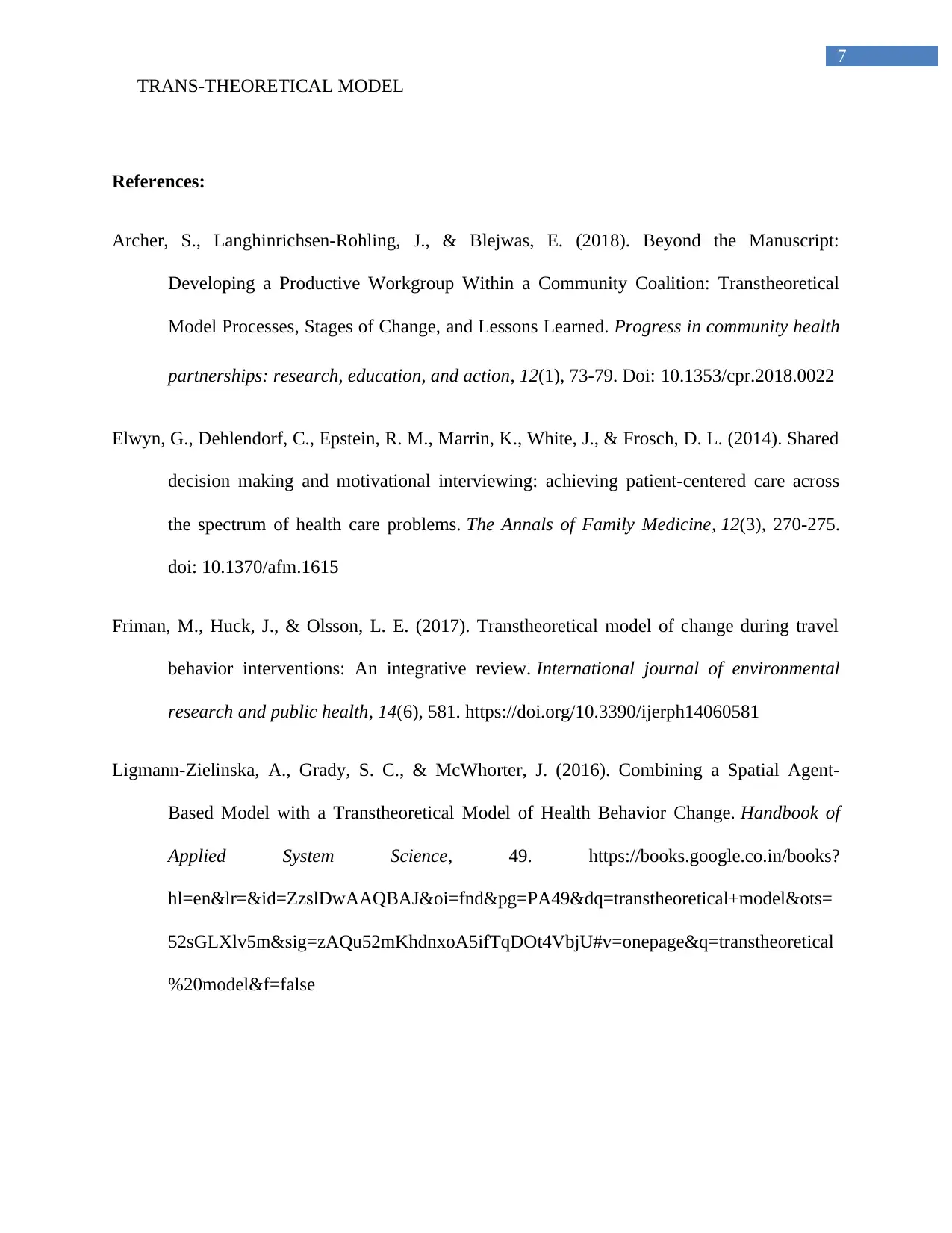
7
TRANS-THEORETICAL MODEL
References:
Archer, S., Langhinrichsen-Rohling, J., & Blejwas, E. (2018). Beyond the Manuscript:
Developing a Productive Workgroup Within a Community Coalition: Transtheoretical
Model Processes, Stages of Change, and Lessons Learned. Progress in community health
partnerships: research, education, and action, 12(1), 73-79. Doi: 10.1353/cpr.2018.0022
Elwyn, G., Dehlendorf, C., Epstein, R. M., Marrin, K., White, J., & Frosch, D. L. (2014). Shared
decision making and motivational interviewing: achieving patient-centered care across
the spectrum of health care problems. The Annals of Family Medicine, 12(3), 270-275.
doi: 10.1370/afm.1615
Friman, M., Huck, J., & Olsson, L. E. (2017). Transtheoretical model of change during travel
behavior interventions: An integrative review. International journal of environmental
research and public health, 14(6), 581. https://doi.org/10.3390/ijerph14060581
Ligmann-Zielinska, A., Grady, S. C., & McWhorter, J. (2016). Combining a Spatial Agent-
Based Model with a Transtheoretical Model of Health Behavior Change. Handbook of
Applied System Science, 49. https://books.google.co.in/books?
hl=en&lr=&id=ZzslDwAAQBAJ&oi=fnd&pg=PA49&dq=transtheoretical+model&ots=
52sGLXlv5m&sig=zAQu52mKhdnxoA5ifTqDOt4VbjU#v=onepage&q=transtheoretical
%20model&f=false
TRANS-THEORETICAL MODEL
References:
Archer, S., Langhinrichsen-Rohling, J., & Blejwas, E. (2018). Beyond the Manuscript:
Developing a Productive Workgroup Within a Community Coalition: Transtheoretical
Model Processes, Stages of Change, and Lessons Learned. Progress in community health
partnerships: research, education, and action, 12(1), 73-79. Doi: 10.1353/cpr.2018.0022
Elwyn, G., Dehlendorf, C., Epstein, R. M., Marrin, K., White, J., & Frosch, D. L. (2014). Shared
decision making and motivational interviewing: achieving patient-centered care across
the spectrum of health care problems. The Annals of Family Medicine, 12(3), 270-275.
doi: 10.1370/afm.1615
Friman, M., Huck, J., & Olsson, L. E. (2017). Transtheoretical model of change during travel
behavior interventions: An integrative review. International journal of environmental
research and public health, 14(6), 581. https://doi.org/10.3390/ijerph14060581
Ligmann-Zielinska, A., Grady, S. C., & McWhorter, J. (2016). Combining a Spatial Agent-
Based Model with a Transtheoretical Model of Health Behavior Change. Handbook of
Applied System Science, 49. https://books.google.co.in/books?
hl=en&lr=&id=ZzslDwAAQBAJ&oi=fnd&pg=PA49&dq=transtheoretical+model&ots=
52sGLXlv5m&sig=zAQu52mKhdnxoA5ifTqDOt4VbjU#v=onepage&q=transtheoretical
%20model&f=false
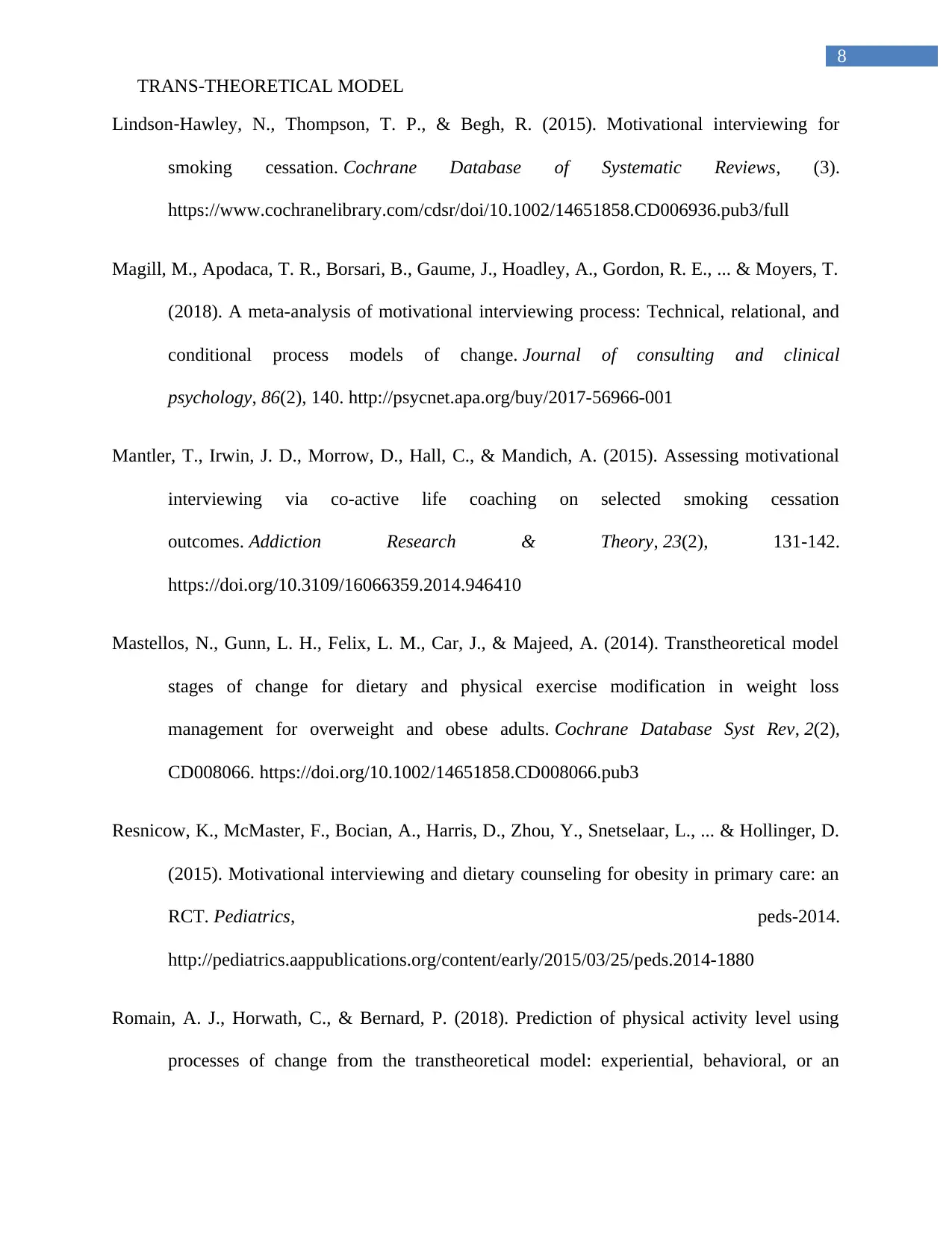
8
TRANS-THEORETICAL MODEL
Lindson‐Hawley, N., Thompson, T. P., & Begh, R. (2015). Motivational interviewing for
smoking cessation. Cochrane Database of Systematic Reviews, (3).
https://www.cochranelibrary.com/cdsr/doi/10.1002/14651858.CD006936.pub3/full
Magill, M., Apodaca, T. R., Borsari, B., Gaume, J., Hoadley, A., Gordon, R. E., ... & Moyers, T.
(2018). A meta-analysis of motivational interviewing process: Technical, relational, and
conditional process models of change. Journal of consulting and clinical
psychology, 86(2), 140. http://psycnet.apa.org/buy/2017-56966-001
Mantler, T., Irwin, J. D., Morrow, D., Hall, C., & Mandich, A. (2015). Assessing motivational
interviewing via co-active life coaching on selected smoking cessation
outcomes. Addiction Research & Theory, 23(2), 131-142.
https://doi.org/10.3109/16066359.2014.946410
Mastellos, N., Gunn, L. H., Felix, L. M., Car, J., & Majeed, A. (2014). Transtheoretical model
stages of change for dietary and physical exercise modification in weight loss
management for overweight and obese adults. Cochrane Database Syst Rev, 2(2),
CD008066. https://doi.org/10.1002/14651858.CD008066.pub3
Resnicow, K., McMaster, F., Bocian, A., Harris, D., Zhou, Y., Snetselaar, L., ... & Hollinger, D.
(2015). Motivational interviewing and dietary counseling for obesity in primary care: an
RCT. Pediatrics, peds-2014.
http://pediatrics.aappublications.org/content/early/2015/03/25/peds.2014-1880
Romain, A. J., Horwath, C., & Bernard, P. (2018). Prediction of physical activity level using
processes of change from the transtheoretical model: experiential, behavioral, or an
TRANS-THEORETICAL MODEL
Lindson‐Hawley, N., Thompson, T. P., & Begh, R. (2015). Motivational interviewing for
smoking cessation. Cochrane Database of Systematic Reviews, (3).
https://www.cochranelibrary.com/cdsr/doi/10.1002/14651858.CD006936.pub3/full
Magill, M., Apodaca, T. R., Borsari, B., Gaume, J., Hoadley, A., Gordon, R. E., ... & Moyers, T.
(2018). A meta-analysis of motivational interviewing process: Technical, relational, and
conditional process models of change. Journal of consulting and clinical
psychology, 86(2), 140. http://psycnet.apa.org/buy/2017-56966-001
Mantler, T., Irwin, J. D., Morrow, D., Hall, C., & Mandich, A. (2015). Assessing motivational
interviewing via co-active life coaching on selected smoking cessation
outcomes. Addiction Research & Theory, 23(2), 131-142.
https://doi.org/10.3109/16066359.2014.946410
Mastellos, N., Gunn, L. H., Felix, L. M., Car, J., & Majeed, A. (2014). Transtheoretical model
stages of change for dietary and physical exercise modification in weight loss
management for overweight and obese adults. Cochrane Database Syst Rev, 2(2),
CD008066. https://doi.org/10.1002/14651858.CD008066.pub3
Resnicow, K., McMaster, F., Bocian, A., Harris, D., Zhou, Y., Snetselaar, L., ... & Hollinger, D.
(2015). Motivational interviewing and dietary counseling for obesity in primary care: an
RCT. Pediatrics, peds-2014.
http://pediatrics.aappublications.org/content/early/2015/03/25/peds.2014-1880
Romain, A. J., Horwath, C., & Bernard, P. (2018). Prediction of physical activity level using
processes of change from the transtheoretical model: experiential, behavioral, or an
⊘ This is a preview!⊘
Do you want full access?
Subscribe today to unlock all pages.

Trusted by 1+ million students worldwide
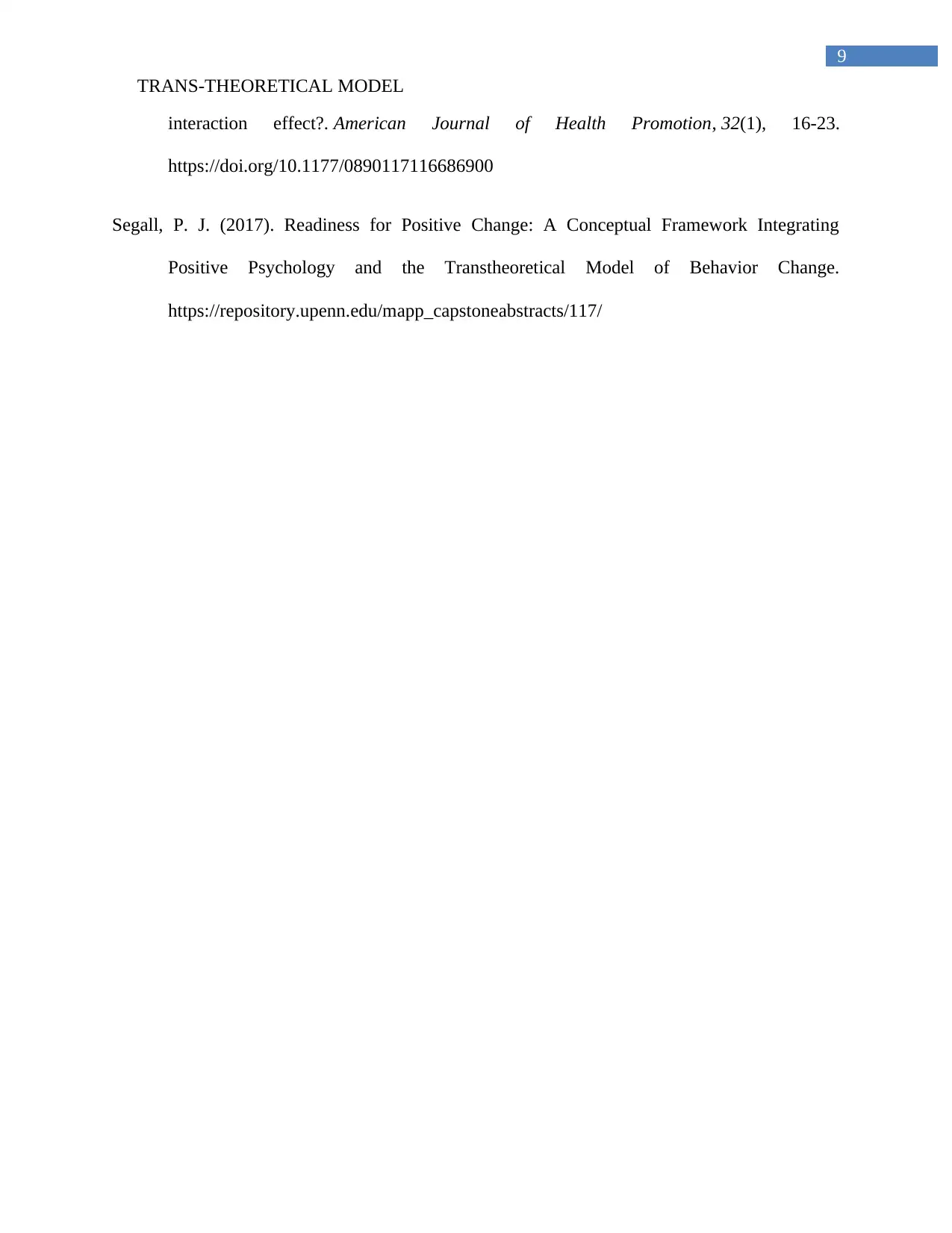
9
TRANS-THEORETICAL MODEL
interaction effect?. American Journal of Health Promotion, 32(1), 16-23.
https://doi.org/10.1177/0890117116686900
Segall, P. J. (2017). Readiness for Positive Change: A Conceptual Framework Integrating
Positive Psychology and the Transtheoretical Model of Behavior Change.
https://repository.upenn.edu/mapp_capstoneabstracts/117/
TRANS-THEORETICAL MODEL
interaction effect?. American Journal of Health Promotion, 32(1), 16-23.
https://doi.org/10.1177/0890117116686900
Segall, P. J. (2017). Readiness for Positive Change: A Conceptual Framework Integrating
Positive Psychology and the Transtheoretical Model of Behavior Change.
https://repository.upenn.edu/mapp_capstoneabstracts/117/
1 out of 10
Related Documents
Your All-in-One AI-Powered Toolkit for Academic Success.
+13062052269
info@desklib.com
Available 24*7 on WhatsApp / Email
![[object Object]](/_next/static/media/star-bottom.7253800d.svg)
Unlock your academic potential
Copyright © 2020–2026 A2Z Services. All Rights Reserved. Developed and managed by ZUCOL.





